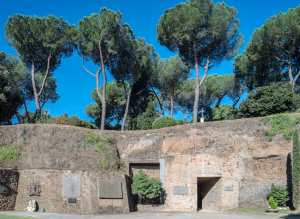NEWS “My father, a victim of the Ardeatine massacre. I finally know what his fate was”
“I’ll tell you immediately how important it is for me to know where my father is buried. Every year, we celebrate Yom HaShoah and, on this occasion, I’ve always lit up the memorial candle (ner neshama) for my father. Why on that day? Because I didn’t know when my father had died. Now that I know, everything’s going to be different. It’s important to be aware of what happened, to see that place, i.e. the Ardeatine Caves, and to understand what these people went through.”
Seventy-six years later, this is what David Reicher said to Pagine Ebraiche about the importance of having discovered that his father Marian was buried in the Ardeatine Caves together with 334 other victims of this Nazi massacre which occurred on 24th March 1944.
Some months ago, the Italian authorities, in collaboration with the National Association of Italian Families of Martyrs of the Ardeatine Massacre (ANFIM), managed to identify one of the nine still nameless people through a DNA test: that person was precisely Marian Reicher.
“My mother made Aliyah to Israel soon after the war, and I was raised here. I asked her so many times to tell me about her time in Italy and about my father. I’ve never heard it from her, not a single thing. It’s as if she were in shock or had suffered a mental blackout,” recounted David, who is the protagonist of the latest video segment by UCEI’s newsroom.
His father’s fate was unknown to his family for many years, no less than seventy-six years.
Meanwhile in Italy, his name had already appeared in 1991 in Il libro della memoria. Gli ebrei deportati dall’Italia (1943-1945) (The Book of Remembrance. Jews deported from Italy (1943-1945), curated by the historian Liliana Picciotto. He was mentioned as a potential victim of the Ardeatine massacre but it was not officially confirmed. “No one in our family knew about that,” emphasized David.
The Reichers had fled from Poland to Italy – Marian was born in Kolomyia, a part of Poland at the time, now Ukraine – and had initially found shelter between Bassano del Grappa, when David’s sister was born in 1942, and Vicenza after which they continued to move south.
“I was born in October 1943,” said David. “My mother told me that my father had disappeared when I was three months old, meaning that he had died a few months later.”
In March 1944, he was killed by the Nazis in one of the most heinous war crimes. “My wife Rivka’s cousin started doing some research about all members of the family and actually discovered something about my mother, my sister, and my father. She also found out that Marian Reicher had gone to Rome and was probably imprisoned there. Then I’ve been contacted by the Families of the Ardeatine Massacre Victims Association and after an e-mail conversation they asked me to send them a DNA sample.”
David did so via the United States because in Israel it is a more complicated process and previous authorisation of the court is required. “On 17th April, they confirmed that my father is buried at the Ardeatine Caves.”
Now the Reichers are waiting for the medical emergency to end in order to come to Rome. “We already had an agreement with the Italian authorities for a ceremony to be held. It’ll be a significant moment for me.”
It will be a chance to mend the bond with an unknown past but still echoing, and especially with Italy. “I was born in Italy, but I don’t know Italian. But I have a further connection with the country – my mother used to call me Danielo when I was a kid.”
When asked about his knowing anything else about his family, he underlines his mother’s reluctance to tell about her past.
“She wasn’t that talkative. I know that she escaped from Poland to Hungary during the Great War, but I don’t know how she met my father. Her first years in Israel were difficult: a salary to bring home, alone, with two kids. After 1955, we obtained compensation from the German government and things went a bit better. Still, we had a hard time.”
Nowadays, David “Danielo” Reicher is seventy-seven years old, he is still working and “doesn’t even think about stopping”. He proudly reminds us that he has eight grandchildren and three great-grandchildren. He will be able to pass on to his offspring the memory of Marian Reicher, a piece of his recomposed family history.
Translated by Mattia Stefani and revised by Claudia Azzalini, both students at the Advanced School of Modern Languages for Interpreting and Translation of Trieste University and interns at the newspaper office of the Union of the Italian Jewish Communities.

